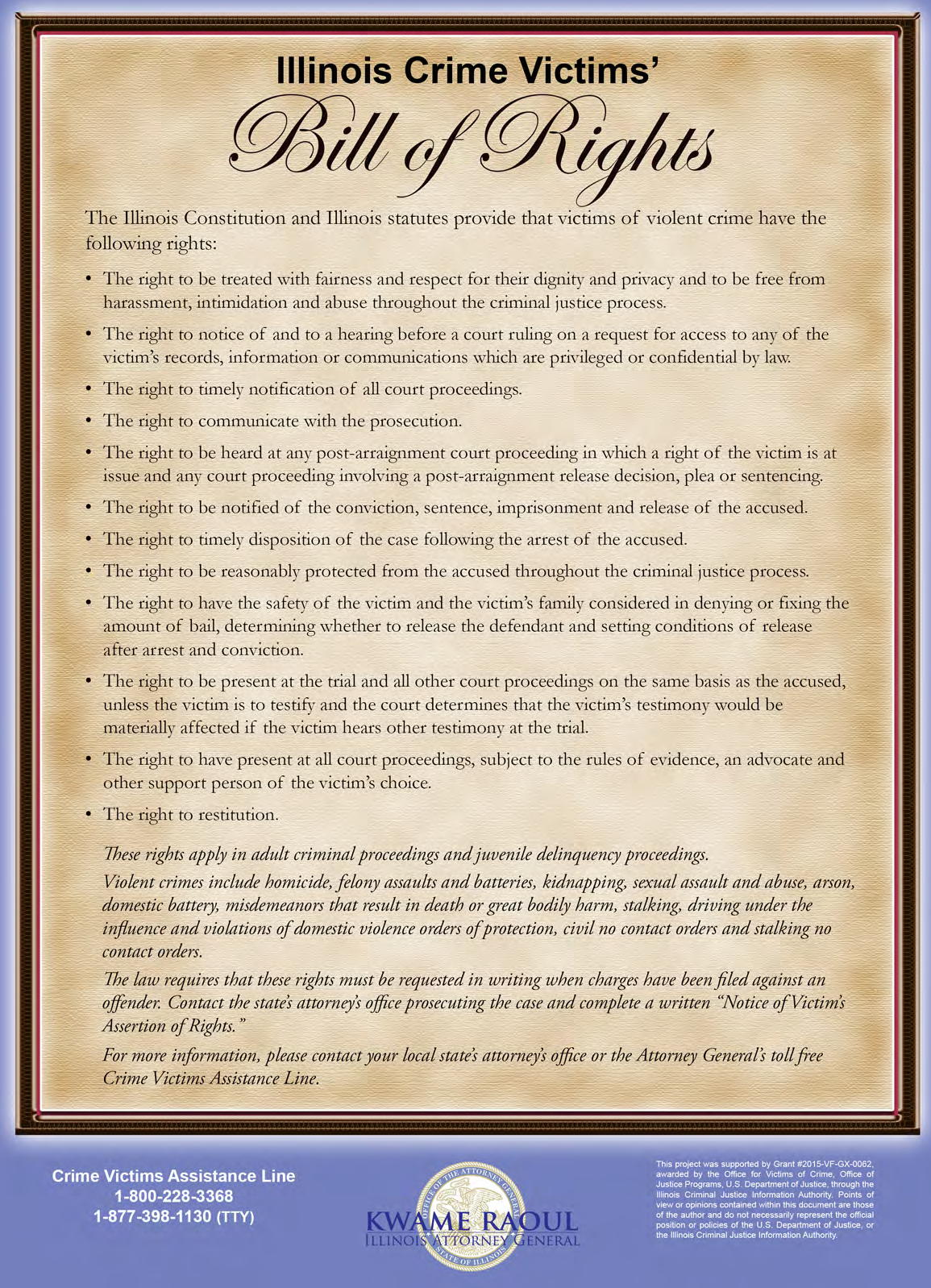Victims' Rights
You Have Rights!
If you are the victim of domestic violence, you have RIGHTS both before and after the perpetrator is charged, if applicable. Some of these rights include:
- To be protected from further abuse, neglect, and exploitation.
- To seek criminal charges against the abuser (NOTE: Jail is not the only outcome if the abuser is found guilty.) The offender may be subject to a period of conditional discharge or probation. Other consequences may include court ordered domestic violence counseling, anger management classes and drug and alcohol compliance.
- To confer with a domestic abuse advocate with confidential or privileged communication.
Law enforcement officers are to use all reasonable means to prevent further abuse, including:
- Arranging for the victim’s transportation to a medical facility or a safe shelter and/or accompanying the victim back to the residence to retrieve belongings.
- Arresting the abuser where appropriate and completing a police report on all bona fide incidents.
- Advising the victim of his/her rights and the importance of seeking medical attention and preserving evidence.
- Seizing weapons that were used to commit the abuse.
- If applicable due to the extreme nature of the crime, after the close of court business hours, arranging for the victim’s transportation to an available circuit judge so the victim may file a petition for an Emergency Order of Protection.
Crime Victim Bill of Rights
The Illinois Constitution guarantees certain rights for crime victims. Generally, victims have rights to be treated with fairness and respect for their dignity and privacy throughout the criminal justice process and to obtain certain information from the criminal justice system. The Rights of Crime Victims and Witnesses Act (725 ILCS 120), commonly referred to as the Illinois Bill of Rights for Victims and Witnesses of Violent Crime, or Victims Bill of Rights, implements, preserves and protects those rights guaranteed by the constitution.

Crime Victim’s Compensation Act
The Crime Victims Compensation Act was established by the Illinois General Assembly in 1973 with the primary goal of helping to reduce the financial burden imposed on victims of violent crime and their families. The Illinois Crime Victims Compensation Program offers reimbursement up to $45,000 for expenses incurred by eligible victims as a result of a violent crime.
The Crime Victims Compensation Act states that the Office of the Attorney General has the statutory duty to process all claims by investigating each claim to determine the claimant’s eligibility. The Attorney General’s Office then makes a preliminary recommendation to award or deny compensation. Ultimately, the Court of Claims makes the final decision.
If you or someone you love is having difficulty coping with the long-term effects of a violent crime, please call the toll-free Crime Victims Assistance Line at (800) 228-3368 for more information about compensation and other statewide victim services or visit the Attorney General's website for additional information and applications.
Safe Homes Act
The Safe Homes Act is an Illinois law that allows victims of domestic or sexual violence to end their rental lease early and leave their home to protect their physical safety and emotional well-being. It does not matter if the lease is written or oral. In certain circumstances, victims can also request an emergency lock change to keep the abuser out of the home. Click here for more information.
Victims' Economic Security and Safety Act
The Victims' Economic Security and Safety Act (VESSA) allows employees who are victims of domestic violence, sexual violence, gender violence, or any other crime of violence or who have family or household members who are victims of such violence to take up to twelve (12) weeks of unpaid leave per any twelve (12) month period to seek medical help, legal assistance, counseling, safety planning, and other assistance. The Act also prohibits employers from discriminating against employees who are victims of domestic violence, sexual violence, gender violence, or any other crime of violence or who have family or household members who are victims of violence. Click here to learn more.
Address Confidentiality Program
The Address Confidentiality Program (ACP) provides a substitute address for victims of domestic violence, sexual assault, human trafficking, and stalking to use instead of their home, school, or work addresses when interacting with State and local government agencies. These government agencies use the ACP substitute address when creating public records to help prevent perpetrators from using publicly available documents to locate victims. The ACP and government agencies cannot remove or delete information already in public records, including addresses. Click here for more information.
